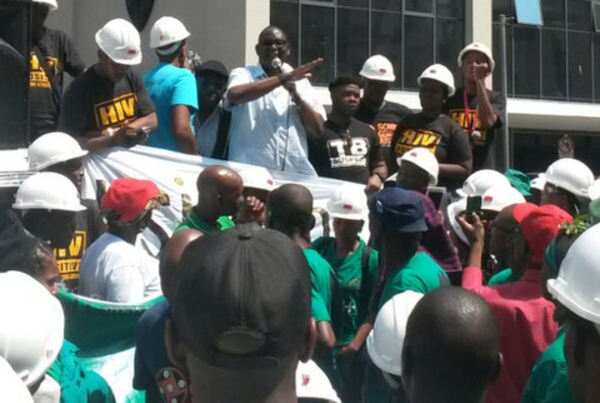

Zwelinzima Vavi addresses protesters supporting miners with silicosis and TB outside the South Gauteng High Court in Johannesburg. Photo by Lwandile Fikeni.
15 October 2015
Lawyers for the mining companies have begun to set out their case in the South Gauteng High Court, which is hearing an application from mineworkers to be allowed to claim for damages due to exposure to silica dust on behalf of a bigger group of affected mineworkers.
The high-profile court case, which involves more than 30 mining companies and affects tens of thousands of former miners, entered its third day on 14 October.
The lawyers for the miners claim that the gold mines did not take the necessary steps to protect gold miners from silicosis and tuberculosis (TB) caused by exposure to silica dust underground. The mining companies are arguing that the court should not certify the case as a “class action”, which would leave miners to take up their own cases against the mining companies as individuals.
Outside the court, members of the Treatment Action Campaign and Sonke Gender Justice gathered to show support for the mineworkers. Both organisations have been admitted to the hearing as “friends of the court”.
Mark Heywood, director of public interest law firm SECTION27, which acts for TAC and Sonke Gender Justice, conveyed to GroundUp the enormity of the case. “There are hundreds of thousands of potential claimants and billions of rands at stake,” Heywood said.
Advocate Michelle Le Roux, a member of the mineworkers’ legal team, tackled the argument that the miners’ lung diseases might be associated with smoking or HIV. “Silicosis is directly caused by silica dust,” she said.
The miners argue that the “class” should contain all miners who have contracted silicosis and tuberculosis (TB) as a result of their exposure to silica dust since 1965, and the families of all miners who have died of silicosis and TB.
Damages should be transmissible to the dependents of mineworkers who had died, Advocate Gilbert Marcus told the court. The miners seek an order declaring that, if a member of the class dies after the institution of the certification application but before it is finalised, the damages to which the member is entitled would be transmissible to his or her deceased estate, Marcus said.
On Wednesday afternoon lawyers for the gold mines began their argument, with Harmony’s lawyers the first to set out their case. Advocate Chris Loxton argued that it didn’t make sense to certify the miners as a class, because the nature of their diseases was so diverse.
Loxton was responding to arguments made by Advocate Wim Trengrove, representing the miners, who had argued that there was enough in common among the miners, that their had been common practices across the industry which resulted in the miners getting sick. Trengrove said that if the miners were certified as a class, a bifurcated trial could be held, in which the first part dealt with issues all the miners had in common, and the second part dealt with issues specific to individual miners.
All South Africa’s big mining companies are affected, including Anglo American, Anglogold, Gold Fields, Harmony Gold, Randgold, DRDGold, and African Rainbow Minerals.
The hearing continues today.
Read more on this case.